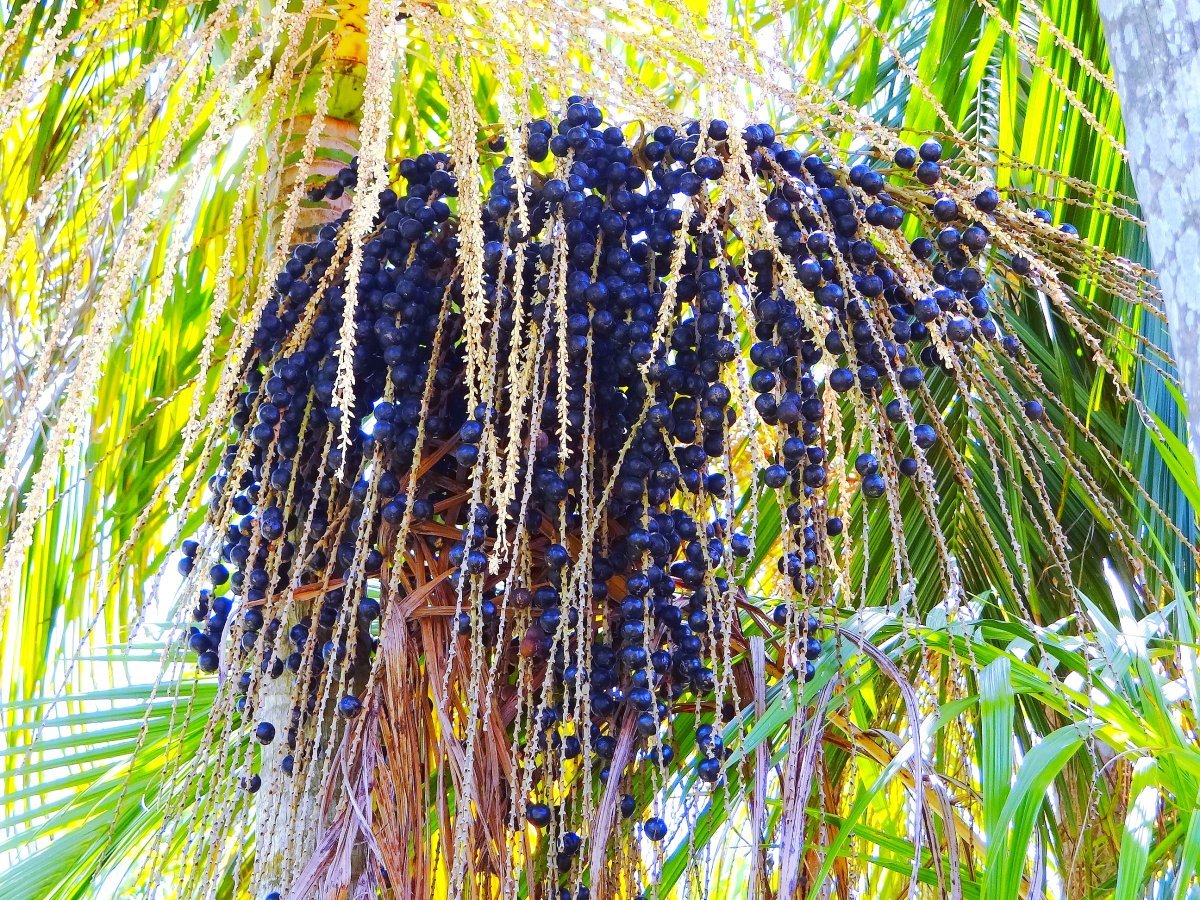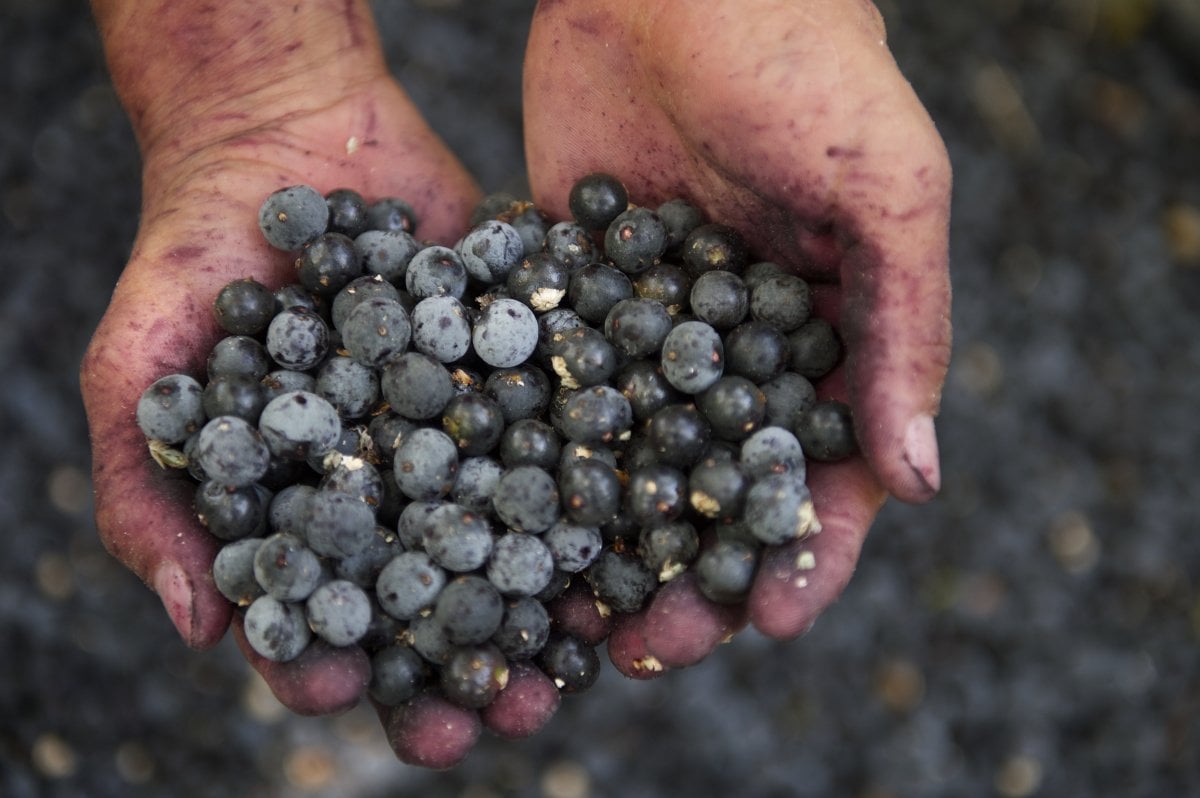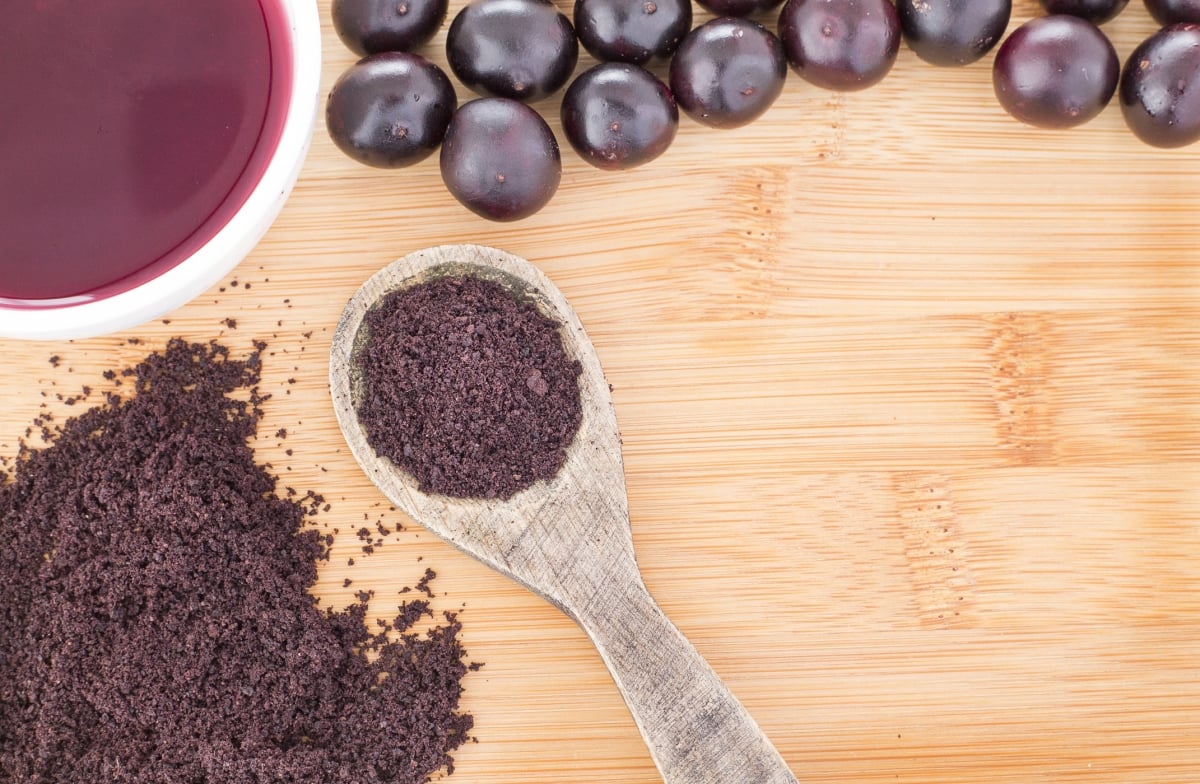The second most common question people ask about acai berries is, “Are they a healthy food?” That’s the question I’ll answer in this article. But first, let’s tackle the most common question: “How do you pronounce ‘acai’?”
If you’re not sure how to pronounce it, you’re in good company. I can’t tell you how many different ways I’ve heard people try to say the word. So, let’s get this settled first.
According to the National Center for Complementary and Integrative Health, you should pronounce acai as “AH-sigh-EE.”
But the good news is, even if you find that challenging, you don’t actually have to pronounce it out loud in order to read all about it!
You may have noticed the abundance of beautiful acai bowls on social media. Piled high with colorful berries and toppings, these bowls have become a huge health-foodie trend over the last decade.
Health food companies often market acai as a superfood with benefits, such as anti-aging and weight loss. But are the health claims accurate?
This article will explain what an acai berry is and what benefits they offer should you choose to add them to your diet.
What Are Acai Berries?

Acai berries are medium-sized, dark purple berries that look like a mix between blueberries and grapes.
They technically aren’t even berries — they’re drupes. (I love that word!) Drupes are fruits that have a central pit rather than a bunch of small seeds inside. Other drupes include peaches, plums, cherries, apricots, and olives.
The berries grow in small bunches on the acai palm tree in the Amazonian rainforests of South and Central America. Specifically, you can find them growing in countries such as Brazil, Venezuela, Ecuador, and Colombia.
Each palm tree can reach 50 to 100 feet tall, with four to eight stems that come together as part of one root system. Every year, each tree stem can produce up to four to eight bunches of berries, with each stem weighing up to 13 pounds.
In Tupi Guarani, a language native to Brazil, the word “acai” means “fruit that cries.” This is thought to be because the berries release water.
Acai berries are rarely in fresh form at the grocery store. This is partly because they’re difficult to transport and have a short shelf life. The berries start to ferment within 48 hours of harvest, even when they’re kept in the refrigerator.
They’re also more seedy than juicy. So many people prefer consuming them dried, as a frozen puree, as a pressed juice, or in capsule form. You can find acai berry products at many health food stores, both brick and mortar and online.
What Do They Taste Like?
Acai berries have a unique flavor.
Some people find them to be tart and not very sweet. Others describe them as a mix between a sweet blackberry and a piece of earthy dark chocolate (sounds to me like a delicious dessert!).
Acai berries and cacao beans are both rich in polyphenols, which may partially explain the similarities in taste.
Acai Berry Nutrition
Here’s a surprising fact: acai berries are fairly high in fat, especially when you compare them to other fruits. There are 5 grams of fat in 100 grams (approximately ½ cup) of frozen acai puree. For reference, half of a large avocado has around 15 grams of fat.
Most of the fats you’ll find in these berries are unsaturated. These include omega-3s, 6s, and 9s, such as alpha-linolenic acid (ALA) and oleic acid. They also contain palmitic acid, a saturated fat found in the fruits of palm trees. Palmitic acid is the most common fat in humans and animals, making up 20 to 30% of the fat in our bodies.
Acai berries are full of antioxidants. Some of these include anthocyanins, polyphenols, and vitamins A, C, and E. When compared to antioxidant-rich blueberries, acai berries have more protein, calcium, iron, and vitamins A and C. They’re also lower in sugar than blueberries.
Acai berries contain various trace minerals and electrolytes as well, such as chromium, zinc, iron, copper, magnesium, potassium, phosphorus, and manganese.
5 Acai Benefits You Should Know

Many of our favorite berries deliver powerful health benefits. What does the research say about the benefits of acai berries?
Do these drupes compare with blueberries, blackberries, and raspberries in their ability to protect and enhance our health? Are they a magic weight loss food?
There are only a few small human studies on acai berries. Many of the claims come from animal studies.
Benefit #1 — They May Help Protect Your Heart
A supplement of acai pulp was shown to reduce “bad” LDL cholesterol in mice who had been fed a high cholesterol diet.
This makes sense because the berries contain plant sterols — cholesterol-like compounds found in fruits, vegetables, nuts, and grains. They prevent the absorption of dietary cholesterol by the body.
In 2011, a very small study done on 10 overweight adults suggested that acai may also have similar benefits for humans. Researchers fed each participant 100 grams of acai pulp two times a day for one month. After 30 days, the participants had lower insulin levels and fasting blood sugar levels than when they started. Additionally, total cholesterol, LDL cholesterol, and the spike in blood sugar they had previously experienced after eating were reduced.
A slightly larger human study was published in 2018 in Clinical Nutrition. Researchers gave forty healthy women between the ages of 21 and 27, 200 grams of acai pulp daily for four weeks. Eating the acai boosted the women’s “good” HDL cholesterol metabolism, which protects the heart. Additionally, they experienced an increase in antioxidant activity.
Antioxidants are powerful compounds found in plant foods. And they can be protective against cell damage that can lead to diseases, such as cancer, cardiovascular disease, and type 2 diabetes.
Other research has found that acai berries improve the flow of blood through the body.
How does this work? The polyphenols in acai can boost nitric oxide production in endothelial cells (the ones found on the inner lining of arteries and blood vessels), which helps to relax the arteries. This can have a positive effect on blood pressure, which is good for the heart.
Benefit #2 — They May Have Anti-Cancer Properties
Acai berries contain pigments called anthocyanins, which give certain fruits and vegetables their deep violet color. Anthocyanins are antioxidants that can help reduce the risk of cancer.
After analyzing 300 foods, acai berries came out on top for their antioxidant content. They beat out other foods known to be very high in antioxidants, including cocoa powder, blueberries, and pomegranates. In fact, just one-half cup of acai contains around 75,000 antioxidant units. This amount was significantly higher than any of the other foods in the study.
The berries have been studied for their ability to attack cancer cells and slow disease progression. But there haven’t been any clinical trials using humans yet. Currently, evidence shows that they’re protective against colorectal cancer development in mice.
A 2006 study conducted in a lab at the University of Florida got closer to demonstrating potential cancer-fighting benefits of the acai berry for people.
The researchers dripped concentrated acai juice on leukemia cells taken from a 36-year-old woman. And they saw something amazing happen: up to 86% of the cancer cells started to self destruct.
Benefit #3 — They May Be Protective of Your Brain
The polyphenols in acai berries might be able to protect your brain from common neurological diseases.
A 2013 in-vitro (test tube) study published in Neuroscience Letters found that acai berry extract was protective against the build-up of beta-amyloid.
Beta amyloids are proteins involved in the development of Alzheimer’s disease. They clump together and basically gum up your brain pathways. This disrupts your brain cells from communicating, leads to inflammation in the brain, and ultimately causes brain cells to die.
Another in vitro study done in 2016 suggested that there might be a place for acai in the treatment of bipolar disorder thanks to its positive effects on brain metabolism.
Furthermore, your brain uses a process called autophagy to keep itself clean and tidy. This means it regularly gets rid of old cells that either don’t work anymore or are toxic — sometimes called “neuronal housekeeping.” Acai berry extract has been shown to boost this brain cleanup.
Benefit #4 — They Can Help Keep Your Skin Healthy
The antioxidants in acai berries fight off free radicals, which can damage your skin.
Since we’re constantly exposed to these free radicals, whether from pollution, environmental contaminants, stress, poor nutrition, or too much ultraviolet light, we need regular doses of antioxidants to repair our skin cells. But this isn’t the only way that acai berries can protect your youthful glow.
A 2017 study published in Toxicological Research found that acai berry water extracts have the potential to help your skin heal wounds. This probably has something to do with it’s polyphenolic and anthocyanin content, which other studies have shown to boost skin collagen and elastin.
Benefit #5 — They May Boost Your Digestive Health
The fiber and antioxidants in acai berries are good for your gut.
Researchers did a preliminary study in 2017, published in Food Chemistry, that looked at the effects of eating acai berries on the human digestive tract. They were able to follow the berries as they were consumed and track how their polyphenols traveled through digestion. Interestingly, approximately half of the original polyphenols made it at least as far as the colon, which is at the end of your digestive tract.
This suggests that acai berries might act as a prebiotic in the colon. This means they have the ability to feed your good gut bacteria, which improves your overall digestive health.
Are Acai Berries Healthy for the Rainforest?
When I hear about foods we’re harvesting from the rainforest, I become concerned.
As demonstrated by the unsustainability of palm oil, getting food from the rainforest can mean destroying habitats where people and animals, often including endangered species, live.
After looking into this a bit more, it was a relief to find out that this may not be the case with most acai berries.
In order to prevent rainforest destruction, many native people harvest the berries themselves, which are produced abundantly twice per year. This means that local harvesters will climb the palm trees and remove the berries by hand, instead of cutting the trees down.
In some areas, acai palms are replacing cattle pastures and supporting natural regrowth along the Amazonian floodplain.
Hopefully, this is starting a widespread trend that influences our harvest of all crops from this delicate ecosystem and around the world.
Acai berries can support indigenous peoples in their effort to develop sustainable economic activity while preserving their rainforest home.
The Downsides to Acai Berries
You might prefer not to think about the potential downsides of a food that clearly has health benefits, but here are a few:
- They can be expensive. A four or eight-ounce bag of freeze-dried acai powder might cost you twenty dollars or more ($14+ for 8 ounces if you buy from Thrive Market). Acai berries are undoubtedly nutritious, but so are a variety of other berries and plant foods that you can probably find at a lower cost. A well-balanced diet based on whole plant foods will give you an abundance of fiber, antioxidants, vitamins, and minerals. So, acai berries are great. But so are a lot of other foods, some of which are a good deal more affordable.
- There are food safety concerns. It doesn’t matter how good a food is for you in theory if eating it can make you sick in actuality. Certain products, such as raw acai juice, have been found to carry Chagas disease. This is a parasite transmitted by triatomine bugs (sometimes called “kissing bugs”). It can cause fever, headaches, and heart and digestive issues. If you purchase acai juice, it’s safest to look for pasteurized versions.
- It may require a lot of food miles. Acai isn’t a local food unless you live in the Amazon. That means the berries and products we make from them may have to travel really far to get to your grocery store or home. Food miles matter because transportation of food emits greenhouse gases that contribute to climate change. Although reducing your consumption of animal products has the most beneficial impact, buying locally is another way to reduce the carbon footprint of your diet.
- Some products may not be as nutritious as the whole food. Since it’s unlikely that you’ll find acai in its whole-fruit form where you live, there are some things to consider when comparing acai products. Check ingredient labels to be sure the pulp doesn’t contain additives you don’t want. And check that frozen puree doesn’t have a bunch of added sugar.
3 Acai Berry Recipes Worth Trying

Tropical Acai Bowl by Cookie + Kate
Some acai bowls can get a little out of hand with their toppings, making them more of a dessert instead. This recipe uses a good variety of fruit as its base, with some healthy recommended additions.
Acai Smoothie by Food With Feeling
This is an easy smoothie for any time of day, made by blending the South American berries with a few other frozen fruits, hemp seeds, and non-dairy milk for creaminess. You could substitute hemp seeds with chia seeds or ground flaxseeds, too.
Acai Banana Sorbet by Food Network
With just a few simple ingredients, you can whip up this berry-licious sorbet for a healthy and refreshing dessert. You can omit the maple syrup and coconut oil if you prefer.
Tell us in the comments below:
-
Have you tried acai? If so, how did you eat it, and what did you think?
-
Do you have any acai berry recipes you love?
Featured Image: iStock.com/Brasil2

